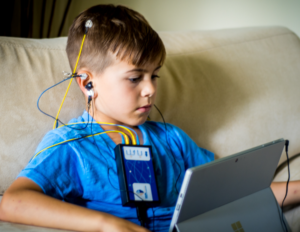Occupational Therapy:
Occupational therapy examines all activities of daily living skills of individuals spanning every area of their life. We identify areas of strengths as well as any barriers due to physical, mental, emotional, developmental or environmental barriers impeding function. Through task analysis, we create individualized treatment plans to assist clients in reaching optimal functioning.
Kidabilities Occupational Therapy has been providing quality therapy to children and their families since 2008. Our therapists have the training and means, to provide occupational therapy to address improving fine motor skills, motor planning, mobility, upper body strengthening, sensory integration disorders, positive behavior supports, all activities of daily living skills (dressing, toileting, etc.), visual motor/perceptual skills and oral motor therapy.

Kidabilities Occupational Therapy is proud to offer Neuroptimal EEG neurofeedback therapy to our pediatric patients. This non-invasive therapy trains the electrical activity to self-regulate via auditory feedback. EEG Neurofeedback successfully treats symptoms of diagnoses such as ADHD, ADD, learning disabilities, autism spectrum disorders and other developmental disabilities by increasing the brain’s resiliency to anxiety, depression, improving attention to task, and decreasing impulsivity in children. During the session we are able to take advantage of children’s level of alertness being in an optimal state for learning. We have developed a three-part, self-regulation program. We teach children to recognize and learn tools for self-calming on a physical, emotional and cognitive level. In addition, we are able to simultaneously implement other therapeutic activities to improve fine motor development, strengthening, visual perceptual skills, executive functioning training, etc. For children with sensory integration difficulties, we are able to provide therapy and education in our sensory integration-based clinic. For more information on how EEG Neurofeedback and occupational therapy can benefit your clients or loved ones, please feel free to contact us.
Session Options:
We work with a variety of in-network insurance providers and offer flexible private pay options. Please note, however, that we are not currently accepting DDD.
Private Pay Rates
- Occupational Therapy Initial Evaluation: $250
- Ongoing Occupational Therapy Sessions: $90 per visit
EEG neurofeedback
An electroencephalography (EEG) records the cortical activity in the brain via a computerized system measured in units of hertz (Hz). Dysregulation and dysfunction are manifested in patterns of electrical activity. EEG neurofeedback uses a form of biofeedback to reward and train the brain to self-regulate. Feedback is typically given visually or from an auditory source. Kidabilities Occupational utilizes Neuroptimal EEG neurofeedback.

What Neuroptimal EEG Neurofeedback has to offer:
- Holistic approach on training electrical activity for improved self-regulation
- The system facilitates the central nervous system to detect and correct itself when it is not functioning optimally. This alleviates the possibility of operator error or the dynamic CNS shifting on one level of functioning causing compensatory, potentially problematic shifting in other areas
- The auditory feedback system works outside the conscious awareness which is extremely beneficial to clients with severe anxiety or cognitive disabilities
- Training occurs in real time which means addressing the brain in its current state, opposed to basing training on a one time “snapshot” provided with a QEEG
What do Kidabilities Occupational Therapists have to offer?
- Knowledge of typical and atypical childhood development
- Understanding of self-regulation on a physical, emotional and cognitive level and having teaching tools to affect change
- Understanding neurophysiology behind dysregulation
- Understanding of the Autonomic Nervous system and roles of the sympathetic and parasympathetic nervous systems
- Understanding of executive functioning and inverse roles of the prefrontal cortex and the limbic system
- Sensory integration disorder and treatment with compensatory techniques
- Role of sensory integration disorders in developmental disabilities, trauma and treatment protocols
- Understanding of the relationship between roles, occupation and mental health implications
- Understanding the pyramid for learning. Why the central nervous system needs to be regulated before cognitive learning can occur
- Identifying strengths and areas for growth from which to facilitate functional change
Session Options:
Neurofeedback sessions are available independently under private pay.
Private Pay Rates
- Neurofeedback Sessions (for all ages): $60 per session
Interactive Metronome
Why Processing Speed Matters
Studies consistently show that Interactive Metronome (IM) improves cognition, attention, focus, memory, speech/language, executive functioning, comprehension, motor and sensory skills, behavior, reading comprehension, sports training, auditory processing, visual attention, hyperactive and impulsivity.
But how does Interactive Metronome achieve this?
The secret to Interactive Metronome is that it enhances and develops three critical factors known to improve brain function:

- Auditory processing – interpreting the sounds ones hears and attaching meaning to them.
- Visual processing – perceiving, analyzing, synthesizing, and thinking with visual stimuli and patterns help us make sense of the exterior world. We store and recall visual stimuli in mental imagery, memories and concepts.
- Motor Skills – refer to the ability to rapidly coordinate body position and a physical response with precision and speed in time and space.
By drastically improving the quality and performance of each of these skills, we positively affect the speed our clients can process and respond to their environment: processing speed!
What is processing speed?
Processing speed measures the time required to respond to or process information in one’s environment. Processing speed affects all aspects of our lives. The goal is faster processing speeds, and we can deliver this with Interactive Metronome.
Slow processing speeds limit our clients to: learn, recall facts, understanding speech and language, communicate effectively, focus and filter out distractions, have good motor coordination and all.
With Interactive Metronome, we can turbocharge every clients to achieve their desired outcomes with more certainty and speed.
IM has 20 years of research and clinical trials.
Session Options:
- 30-Minute Session – $50
- 60-Minute Session – $100
These sessions provide personalized support and are tailored to each client’s developmental and therapeutic needs.

